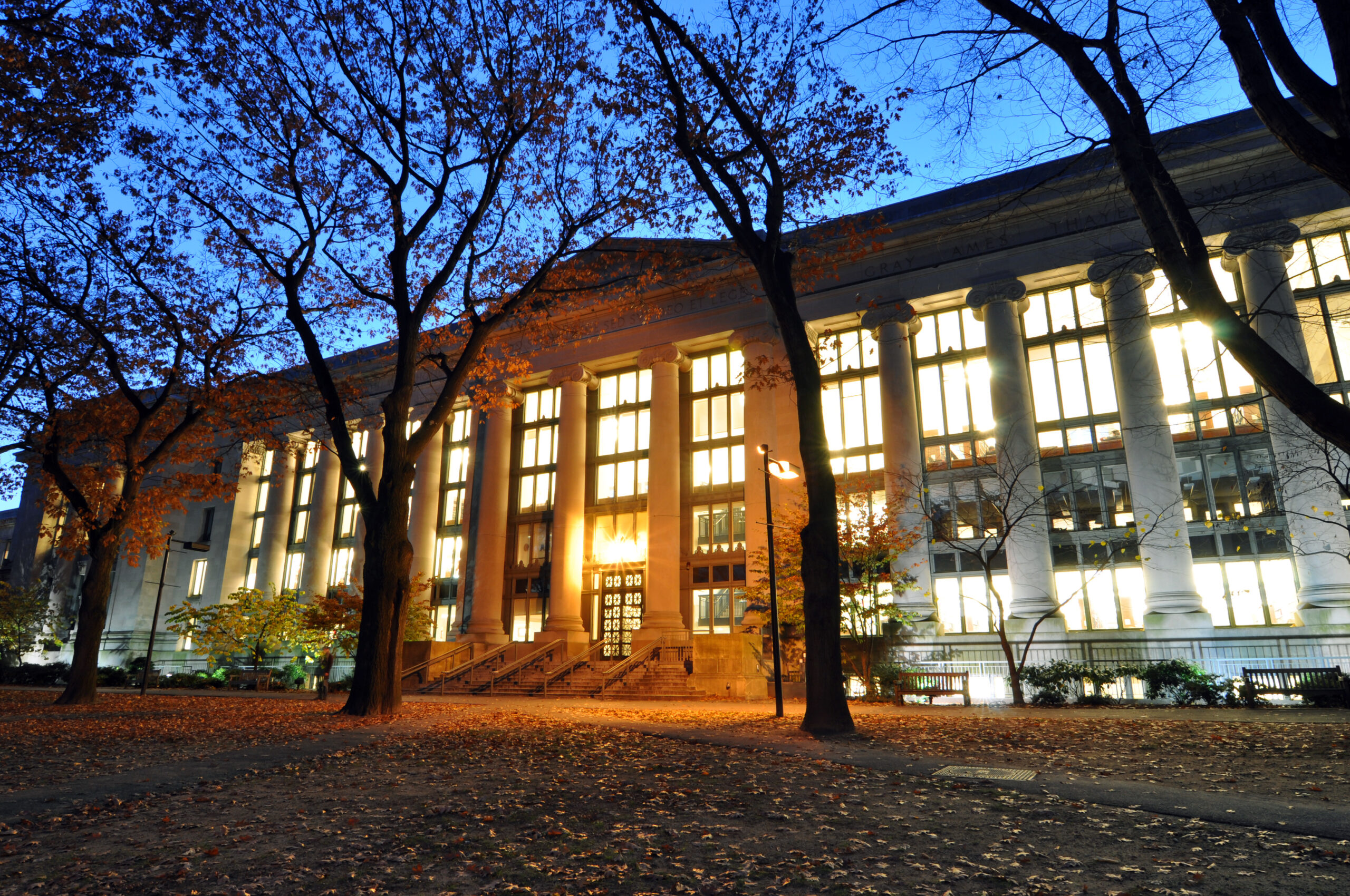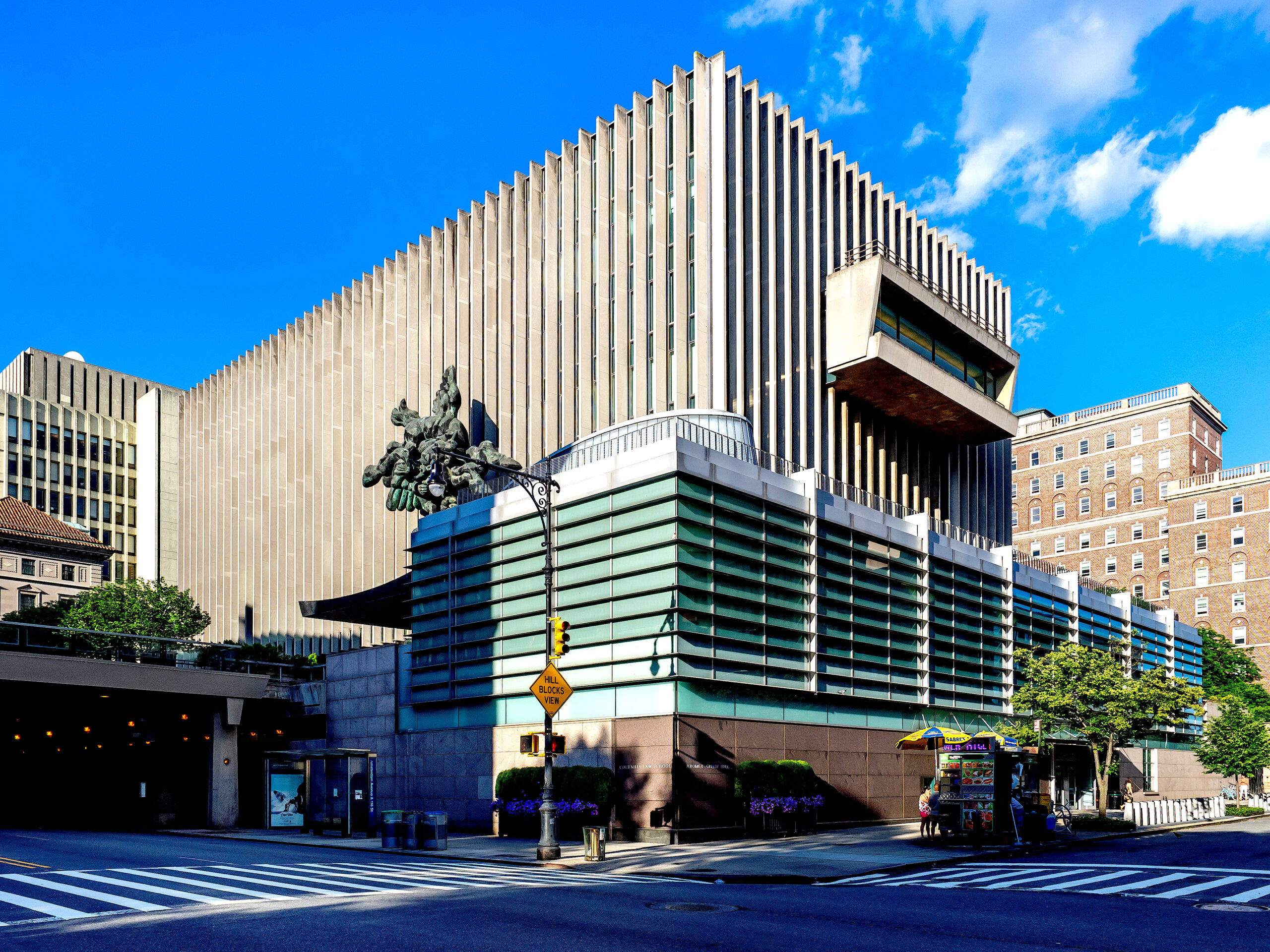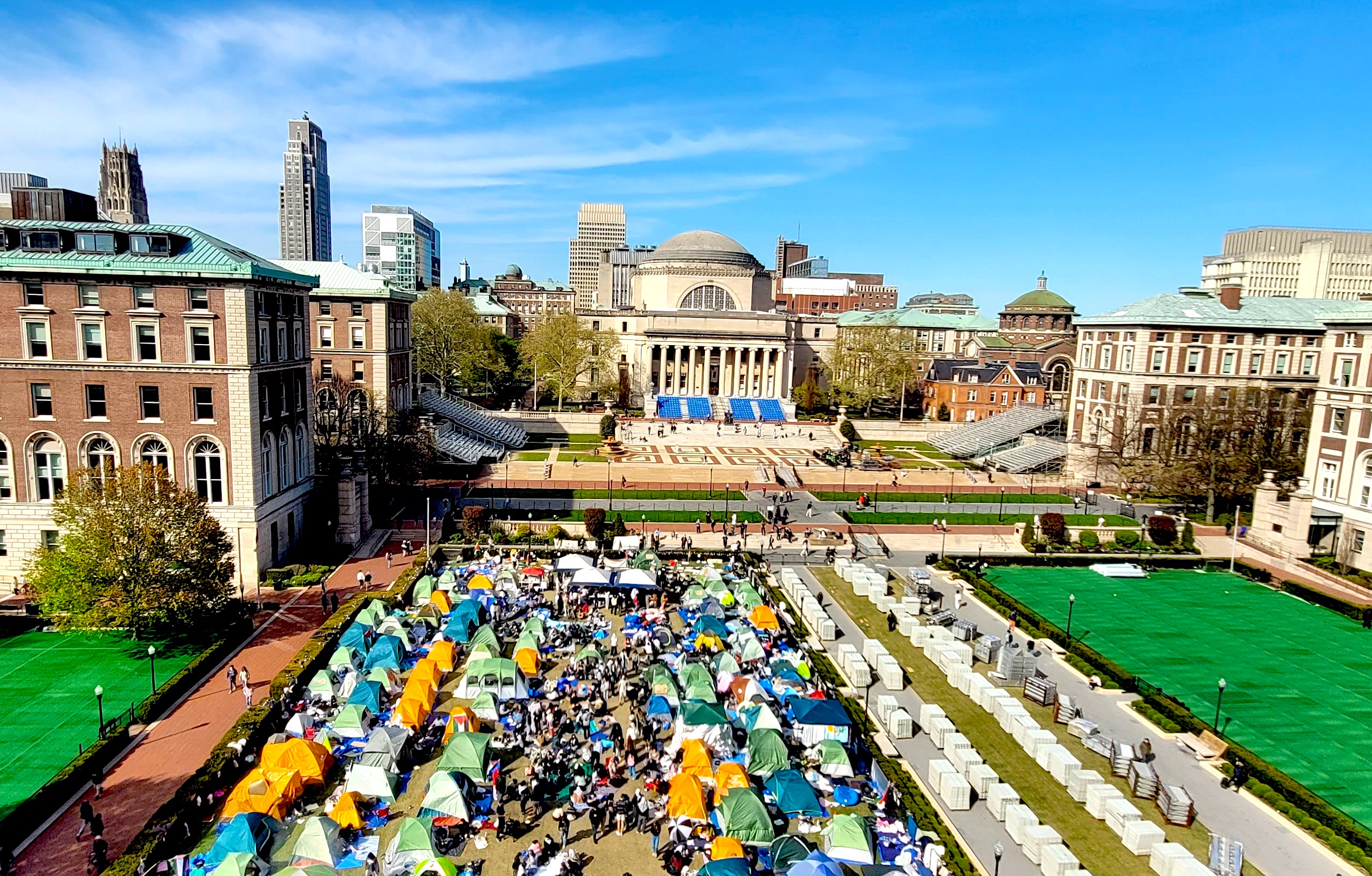Jonathan Cook comments on The Intercept‘s coverage of two prestigious law reviews’ censorship of a Palestinian scholar.

Harvard Law School Library in Langdell Hall at night, 2009. (Chensiyuan, Wikimedia Commons, CC BY-SA 4.0)
By Jonathan Cook
Jonathan-Cook.net
 Anyone who imagines there is something resembling academic freedom in the U.S., or elsewhere in the West for that matter, needs to read this article in The Intercept on an extraordinary – or possibly not so extraordinary – episode of censorship of a Palestinian academic.
Anyone who imagines there is something resembling academic freedom in the U.S., or elsewhere in the West for that matter, needs to read this article in The Intercept on an extraordinary – or possibly not so extraordinary – episode of censorship of a Palestinian academic.
It shows how donors are the ones really pulling the strings in our academic institutions.
Here’s what happened:
1. The prestigious Harvard Law Review was due to publish its first-ever essay by a Palestinian legal scholar late last year, shortly after Hamas’ Oct. 7 attack in Israel. Hurrah (finally) for academic freedom!
2. However, the essay, which sought to establish a new legal concept of the Nakba — the mass expulsion of Palestinian civilians from their homeland in 1948 to create what would become the self-defined Jewish state of Israel — was pulled at the last moment, despite the fact the editors had subjected it to intense editorial checks and scrutiny. The Harvard Review got cold feet — presumably because of the certainty the essay would offend many of the university’s donors and create a political backlash.
3. Editors at the rival Columbia Law Review decided to pick up the baton. They asked the same scholar, Rabea Eghbariah, to submit a new, much longer version of the essay for publication. It would be the first time a Palestinian legal scholar had been published by The Columbia Law Review too. Hurrah (finally) for academic freedom!
4. Aware of the inevitable pushback, 30 editors at the Review spent five months editing the essay, but did so in secret and mostly anonymously to protect themselves from reprisals. The article was subjected to unprecedented scrutiny.
5. Alerted to the fact that the essay had been leaked and that pressure was building from powerful figures associated with Columbia University and the Washington establishment to prevent publication, the editors published the article this month, unannounced, on the Review’s website. Hurrah (finally) for academic freedom!

Jerome L. Greene Hall, home of the Columbia Law School. (Ajay Suresh, Wikimedia Commons, CC BY 2.0)
6. But within hours, the Review’s board of directors, comprising law professors and alumni, some with official roles in the federal government, demanded that the essay be taken down. When the editors refused, the whole website was pulled offline. The homepage read “Website under maintenance.”
7. Hurrah for… the Israel lobby (again).
If even the academic community is so browbeaten by donors and the political establishment that they dare not allow serious academic debate, even over a legal concept, what hope is there that politicians and the media — equally dependent on Big Money, and even more sensitive to the public pressure of lobbies — are going to perform any better.
If you can’t see what’s happening in the US right now to protect Israel — the systematic assault on our basic rights of free speech and academic freedom — it’s because you don’t want to see it: https://t.co/oSwowzuDVb
— Glenn Greenwald (@ggreenwald) June 5, 2024
University complicity in the Gaza genocide – brought out of the shadows by the campus protests — highlights how academic institutions are tightly integrated into the political and commercial ventures of Western establishments.
The universities’ savage crackdown on the student encampments — denying the students any right to peacefully protest complicity in genocide by the very institutions to which they pay their fees — further underscores the fact that universities are there to maintain the semblance of free and open debate but not the substance.
Debate is allowed but only within strictly controlled, and policed, parameters.

Gaza Solidarity Encampment at Columbia University in New York on April 23, 2024. (Abbad Diraniya, Wikimedia Commons, CC0)
Academic institutions, politicians and the media speak as one on the Gaza genocide for a reason. They are there not to promote a dialectic in which truth and falsehood can be tested through open discussion, but to confer legitimacy on the darkest agendas of the establishment they serve.
Our public debates are rigged to avoid topics that would be difficult for western elites to counter, like their current support for genocide in Gaza.
But the very reason we have a genocide in Gaza is because lots of other debates we should have had decades ago have not been allowed to take place, including the one Eghbariah was trying to raise: that the Nakba that began in 1948 and has continued ever since for the Palestinian people needs its own legal framework that incorporates apartheid and genocide.
Israel’s genocide in Gaza was made possible precisely because Western establishments avoided any meaningful scrutiny of, or engagement with, the events of the Nakba for more than 75 years. They pretended either that the ethnic cleansing of 1948 never happened, or that it was the Palestinians’ choice to ethnically cleanse themselves.
In the decades that followed, Western establishments pretended that the illegal colonisation of Palestine by Jewish settlers and the reality of apartheid rule faced by Palestinians — hidden under the rubric of a “temporary occupation” — either weren’t happening, or could be solved through a bogus, bad-faith “peace process.”
There was never accountability, there was no truth or reconciliation. The Western establishment are still furiously avoiding that debate 76 years on, as Eghbariah’s experiences at the hands of the Harvard and Columbia Law Reviews prove.
We can only pray we don’t have to wait another three-quarters of a century before Western elites consider acknowledging their complicity in the genocide of Gaza.
Jonathan Cook is an award-winning British journalist. He was based in Nazareth, Israel, for 20 years. He returned to the U.K. in 2021.He is the author of three books on the Israel-Palestine conflict: Blood and Religion: The Unmasking of the Jewish State (2006), Israel and the Clash of Civilisations: Iraq, Iran and the Plan to Remake the Middle East (2008) and Disappearing Palestine: Israel’s Experiments in Human Despair (2008). If you appreciate his articles, please consider offering your financial support.
This article is from the author’s blog, Jonathan Cook.net
The views expressed are solely those of the author and may or may not reflect those of Consortium News.
Please Donate to the
Spring Fund Drive!



Anyone who wishes to understand the filters on information should refer to Noam Chomsky and Edward Herman’s analysis of news media, Manufacturing Consent, though probably along with Thomas Kuhn’s Structure of Scientific Revolutions. The energies of academic business circulate somewhat differently, but the principles remain the same. Schools do not alienate the money.
Owners are similar, of course. Advertisers are not the major money source for schools, but they get donations and reputation from research undertaken by the grad departments. Research done for government is almost always military, so administrations support wars. Research done for corporations is done for vested interest: the university is to paid to assemble a story that antidepressants solve problems, that herbicides do not kill consumers, and so forth. Such “research” is paid for with grants by large institutions with public relations difficulties. Incoming freshmen with student loans are a money source, of course, but usually flock to stories of prestige rather than certain sorts of political opinion, though both may sometimes be involved.
We do not call our students “clients” because there is an aspect of priesthood to the university: a disinterest in money would indeed be useful for the profession were it to exist. But of course people administering to the business of these large institutions do track where money comes and goes.
This particular priesthood is probably in something like the condition of the journalistic world before two-way online discourse broke most of the heritage media a couple decades ago–of some use, but quite distinctly corrupt. And, generally, they are slow and unresponsive institutions, with some professionals who provide the rest with some glimmer of authenticity, by association and because people have had trouble stumbling through to a better way.
The capture of Institutions by Donors is a huge problem, and is only getting worse. It is creating group think in ways we have never seen before, and the exclusion of those who do not subscribe to the prevailing group think is making it impossible to have debate in our society, as the students on graduation go on to lead our society only knowing the allowed perspectives.
This is creating a new “Dark Age”
Of course, part of the problem for the US is that if you dig too deeply into the Palestinian story you can begin to see the many parallels with the American story.
The trend is toward more of this even in public colleges and universities.
It would be nice if at least the taxpayer-funded institutions were free not only of donor interference but that of the foundations and astroturf groups of the very wealthy that are crippling not just debate but our ability to educate.
Just the other day, I was walking around the University of Pennsylvania main campus, and with all of the closed-off areas I had to navigate around (several of which were clearly and unambiguously not due to ongoing construction projects), boy, was it abundantly clear that the administration and donors over at the college founded by no less than Benjamin Franklin himself really are not big fans of the First Amendment at all.
Instead, moreso than even when the Foundation for Individual Rights and Expression (FIRE) had already rated them the second worst-ranked academic institution for free speech in September 2023, they have made it quite apparent that they would much rather have a rigid totalitarian social order without such constitutional guarantees (assuming they got to continue presiding over it, of course, whether or not some of them can foresee the inevitable purges that will still occur amongst themselves for saying or doing anything perceived as remotely inconvenient)!
Assange was/is the canary locked up in the coal mine.
What I find especially reprehensible is the way Christian and religious Zionists and fundamentalists have been thrilled at the idea of Jews returning to their ancient biblical homeland as fulfillment of Bible prophecy, starting the timetable to the return of Jesus Christ (but not before Armageddon). Opposing or not supporting Israel is thus tantamount to standing in the way of God’s plan.
I remember being exposed to this thinking when I was a college student in the early 1970’s and became briefly involved with the fundamentalist organization Campus Crusade for Christ. I first assumed that if they were about Christianity and Jesus Christ they had to be good people. Through them I was introduced to Hal Lindsey and his book The Late Great Planet Earth, and this business about the supposed “Rapture” that many Christians were excited about. And Hal Lindsey was a quintessential Zionist Christian.
I soon found that I had very serious problems with their way of thinking. I detail this in my write-up linked to by my screen handle.
However it is only in recent years, I think some time after the year 2000, that I became fully aware of the absolute evil that the Israelis had always been doing to the Palestinians. For a long time it did not occur to me to think that Christians could be on the wrong side of things in such a blatant and obvious way (even if I might have had trouble with some of their beliefs).